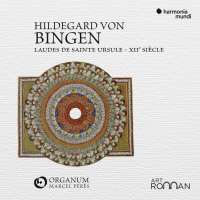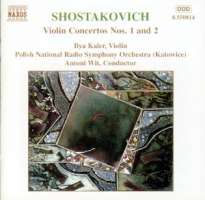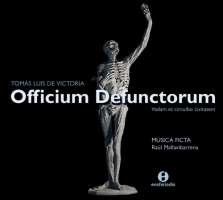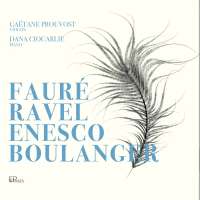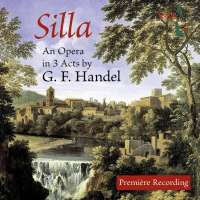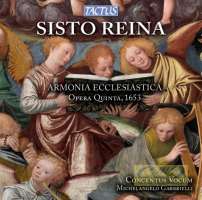
kompozytor
Aichinger, Gregor
tytuł
Aichinger: Virginalia, 1607
wykonawcy
Concentus Vocum;
Gabbrielli, Michelangelo
Gabbrielli, Michelangelo
nr katalogowy
TC 560101
opis
The experience of Gregor Aichinger (Regensburg, 1564/65 – Augsburg, 20/21 January 1628) in Italy, which took place during two distinct periods, made it possible for the Bavarian musician to be an important connection between the music that was practiced at that time in Italy and the musical culture on the other side of the Alps (Aichinger was one of the very first German musicians to publish compositions with basso continuo, a practice with which he had become acquainted precisely during his visits to Italy). The Virginalia consist of twenty five-part pieces. The introductory one, Virgo, Dei mater pura, is followed by the pieces of the Joyful Mysteries (from the second to the sixth), then – from the seventh to the eleventh – by those of the Sorrowful Mysteries, and subsequently – from the twelfth to the sixteenth – by those of the Glorious Mysteries. In the last four pieces there is a contemplation of the Virgin Mary, by now projected in a light and a dimension that are beyond the world, as the mediator between mankind and God. The collection dedicated to Maria is performed by the Ensemble Concentus Vocum directed by Michelangelo Gabbrielli, already protagonist in some important world premiere recording of the Armonia Ecclesiastica 1653 by Sisto Reina [TC 621801].
•Gregor Aichinger: Virgo, quae salutata
•Gregor Aichinger: Virgo, quae charitate ardens
•Gregor Aichinger: Virgo, Mater benigna
•Gregor Aichinger: Virgu quae tuum Natum
•Gregor Aichinger: Virgo, cui post dolores; Virgo, quae benedictum filium ttum
•Gregor Aichinger: Virgo, quae dulcis nati
•Gregor Aichinger: Virgo, quae caput sanctum
•Gregor Aichinger: Virgo, cuius dilectus filius
•Gregor Aichinger: Virgo, quae clavis nudum
•Gregor Aichinger: Virgo, quae prima sole
•Gregor Aichinger: Virgo, quae triumphantem filium; Virgo quae comitata Apostolis
•Gregor Aichinger: Virgo, cuius in coelum anima assumpta fuit
•Gregor Aichinger: Virgo, quae coronata a Sancta Trinitate
•Gregor Aichinger: Virgo, coeli Regina
•Gregor Aichinger: Virgo, sole vestita
•Gregor Aichinger: Virgo, cuius stat luna sub predibus
•Gregor Aichinger: Virgo, sublime exemplum
•Andrea Gabrieli: Toccata im 8. Ton
•Andrea Gabrieli: Ricercare im 8. Ton •Giovanni Gabrieli: Toccata im 2. Ton
•Giovanni Gabrieli: Fuge im 6. Ton
•Giovanni Gabrieli: 2 Toccaten
Works:
•Gregor Aichinger: Virgo, Dei Mater pura
•Gregor Aichinger: Virgo, quae salutata
•Gregor Aichinger: Virgo, quae charitate ardens
•Gregor Aichinger: Virgo, Mater benigna
•Gregor Aichinger: Virgu quae tuum Natum
•Gregor Aichinger: Virgo, cui post dolores; Virgo, quae benedictum filium ttum
•Gregor Aichinger: Virgo, quae dulcis nati
•Gregor Aichinger: Virgo, quae caput sanctum
•Gregor Aichinger: Virgo, cuius dilectus filius
•Gregor Aichinger: Virgo, quae clavis nudum
•Gregor Aichinger: Virgo, quae prima sole
•Gregor Aichinger: Virgo, quae triumphantem filium; Virgo quae comitata Apostolis
•Gregor Aichinger: Virgo, cuius in coelum anima assumpta fuit
•Gregor Aichinger: Virgo, quae coronata a Sancta Trinitate
•Gregor Aichinger: Virgo, coeli Regina
•Gregor Aichinger: Virgo, sole vestita
•Gregor Aichinger: Virgo, cuius stat luna sub predibus
•Gregor Aichinger: Virgo, sublime exemplum
•Andrea Gabrieli: Toccata im 8. Ton
•Andrea Gabrieli: Ricercare im 8. Ton •Giovanni Gabrieli: Toccata im 2. Ton
•Giovanni Gabrieli: Fuge im 6. Ton
•Giovanni Gabrieli: 2 Toccaten
nośnik
CD
gatunek
Muzyka klasyczna
producent
Tactus
data wydania
02-11-2023
EAN / kod kreskowy
8007194107746

(Produkt nie został jeszcze oceniony)
cena 68,00 zł
lubProdukt na zamówienie
Wysyłka ustalana indywidualnie.
Darmowa wysyłka dla zamówień powyżej 300 zł!
Darmowy kurier dla zamówień powyżej 500 zł!
sprawdź koszty wysyłki
